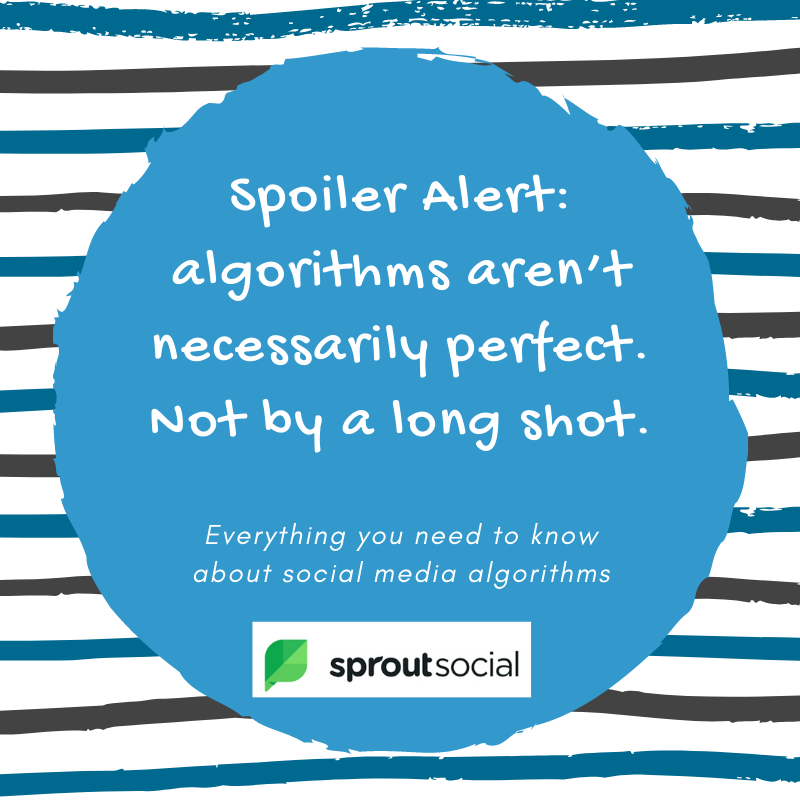 Do you wonder how the heck certain emails get past the spam filter?
Do you wonder how the heck certain emails get past the spam filter?
Emails with blatant abuse. Right there in the headline. Yet somehow, they get through to your inbox while Aunt Mary’s latest email is sent to Junk Jail.
Search engines and social media platforms have their own form of filtering. And each has a specific formula (algorithm) for reaching the coveted top posting spots.
- But do the rules deliver what’s relevant to you?
- Or have social media platforms become the latest lousy spam filter?
- Or is there something far worse going on?
Social Media and Algorithm Angling
I won’t pretend to understand social media algorithms. People much smarter than me spend a lifetime trying to decode the convoluted thinking that leads to greater online visibility (maybe).
Similar to an email spam filter, a programmed algorithm sifts through its “rules” to weed out the bad from the good. The established triggers stop unworthy content in its tracks. Or so platform marketers hope you believe.
Who hasn’t played the algorithm angling game to outsmart Google’s latest set of changing rules?
- Figuring out the best keyword
- Battling for a top spot on Google’s search engine results page (SERP)
- Acing the PageRank system
But the fact that Google (and every other social media platform) regularly changes its algorithm shows the flaws in the system.
- Someone is always going to figure out how to game the system
- And sometimes the algorithms don’t get it right
Something Worse?
Any good marketer knows the key to keeping customers is giving them what they want. But, one aspect of technology and social media platforms that has always bugged me is what I call “thinking for me”.
Perfect example? Auto-correct features. I cannot tell you how many times I scream, Stop thinking for me! It took smart(?)phones the longest time to learn that the abbreviation for Idaho was ID and to stop auto-correcting my text to read I’d (even when I put Boise in front of ID).
Better examples? You may wonder what’s more infuriating than auto-correct. How about social media platforms deciding what you should see?
- LinkedIn – I’m not sure if the networking platform still does it, but it drove me crazy when LinkedIn decided what influencers I should follow. Their articles and posts populated my feed whether I wanted them to or not.
- Facebook – Users often complain about what shows up first in their feeds. Sure, you can select “Most Recent,” but it flips right back to “Top Stories”.
Something worse? Perhaps the worst offense (in my humble opinion) is silencing writers without a discernible reason for doing so.
Case in Point
Sharon Hurley Hall is a well-known, freelance business-to-business (B2B) content writer. After the death of George Floyd, Sharon expanded her extensive portfolio to include anti-racism articles, primarily featured on Medium.
Several gifted writers have emerged during these tragic times, and social media platforms embraced the #BlackLivesMatter content. But, that may be changing.
Sharon and writers she followed began seeing their posts disappear. One minute it was there – then, *Poof,* it was gone. In Sharon’s case, followers told her they received one of the following notices.
- This article has been reported as offensive
- This article violates community standards
- This URL is blocked
Facebook provided the above reasons. However, Instagram and LinkedIn have taken similar tactics with their social media filter. Looks like anti-racism themes are no longer in vogue.
The Tricky Tightrope
Most of us appreciate when social media platforms take a stand against misleading or offensive posts. Some of us wish it would happen more often. But, it’s a tricky tightrope to navigate.
- What constitutes misleading or offensive? Heck, plenty of sales ads mislead routinely.
- Email spam filters show how frequently automated blocks fail – on many levels
As I prepared to publish this post, the news update, Facebook and Instagram to examine racist algorithms, hit my LinkedIn feed. So, the suppressing of these posts is significant. But, if this is an algorithm problem, how did so many anti-racism posts populate social media in the first place?
It has only been in the last few weeks that they suddenly began disappearing after posting. And (as far as I know), the algorithm hasn’t changed in the last two weeks. I could be wrong about that. I do not closely follow that kind of activity.
Sharon pointed her readers to her article, The Loneliness of the Sole Black Employee. Read it for yourself and see if you can figure out what is offensive or a violation of community standards.
If you’d like to know more about the issue, read Aaisha Joseph’s post: LinkedIn: The Moderator of the Black Professional Voice? We Need Answers. The online harassment is mind-boggling and disgusting.
So, what do you think?
- Are social media algorithms just the next lousy spam filter?
- Or is something else going on with so many blocked posts?
Would love to have you share your thoughts in Comments.
=====================
Helping you Keep it simple, clear & uniquely yours
=====================


Cathy, thanks for amplifying this concern. Like you, I also dislike algorithms thinking for me (there are some things I can’t get autocorrect to understand). But the suppression of legitimate opinions is more serious. I hope we’ll see some serious action on this issue.
Much more serious, Sharon. I have strong Pollyanna tendencies but even this Pollyanna has been appalled at what I learn from you and other anti-racist writers. Aaisha’s post on LinkedIn is highly disturbing and her shared comments are the epitome of the crazily different standards being applied that go waaaay beyond an algorithm.
Thanks for all you do, Sharon.
Whereas I don’t doubt that there are some double standards in blocking posts on certain topics, I also believe it depends on where the information’s coming from. Facebook is blocking a lot of stuff from Medium lately; since I don’t use the platform it’s hard to say whether it’s them or the topics..
They haven’t blocked anything I’ve put up, and I’ve certainly taken on the topic. Maybe because they know it’s me and my platforms as opposed to Medium, although they could certainly decide to block a YouTube video.
I wish I knew more, but I don’t. While I’ve never had anything personally blocked, I know people who have. Maybe I sculpt my followers better, since all it takes is one person you’re connected to who doesn’t like something and can complain about it. That goes back to basic social media skills; verify who you’re connected with and determine if you trust them… if not, remove them.
Hi, Mitch. Nice to see you here. Thanks for commenting. I know Sharon wondered the same thing about Medium. She’s been experimenting with various posting techniques to see what happens. I’m not sure if she noticed any patterns yet.
I hadn’t thought about the follower angle. If the political and pandemic scene has shown me anything, it’s that followers you thought you knew can surprise you. Eye-opening, to say the least. Thanks again for sharing your thoughts, Mitch.